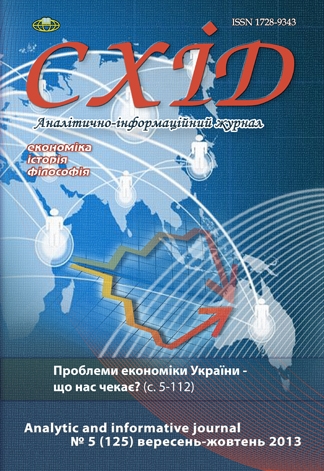M. Heidegger’s philosophy mirrored in sociology of knowledge of P. Bourdieu and R. Collins
DOI:
https://doi.org/10.21847/1728-9343.2013.5(125).19069Keywords:
structural homology, situational analysis, sociology o knowledge, intellectual field, discourse, receptive dispositionAbstract
Heidegger proved to be one of the key thinkers of the last century. His philosophical legacy accompanied by affluent body of critical literature disclose the horizon for any local philosophical community, e. g. the Ukrainian one, to obtain its own language and problematic. To work out a appropriate receptive disposition towards Heidegger’s thought, we have to generalize the logics of some constituted histories of reading Heidegger in Continental, Anglo-Saxon, and Russian intellectual fields. Contemporary historico-philosophical discourse dominated by receptive disposition of history of ideas omits social references of philosophical texts. This is symptomatic for ontological, existential, and lingual focuses on Heidegger, so characteristic for Ukrainian studies. We try to work out the interpretative disposition of situational analysis of Heidegger’s discourse on the methodological and conceptual basis provided by P. Bourdieu and R. Collins’s sociological views on Heidegger. Our goal here is to find a possibility to appropriate certain elements from sociology of knowledge to the apparatus of historico-philosophical analysis, although sociology of knowledge is suspected to be more valuable in explaining biasis than in accounting for correct opinions and adequate interpretations. This controversy between sociological and philosophical fields made us consider the critical reception of P. Bourdieu’s issues. What is really relevant to the tasks of historical and logical reconstructions of Heidegger’s thought, its contexts and evolution is Bourdieu’s claim to consider its polyphonic nature, its stylistics evolving from pragmatic force of Sein und Zeit to prophecies of the poetic thinking to come in the history of Being. We argue that such concepts of sociology of knowledge as structural homology, intellectual field, and symbolic capital can substantially enforce and enrich historico-philosophical studies, being framed in the disposition of situational analysis of philosophical texts.
Downloads
References
Бикбов А. Бурдье / Хайдеггер: контекст прочтения / А. Бикбов // Бурдье П. Политическая онтология Мартина Хайдеггера / Пьер Бурдье ; [пер. с фр. А. Бикбова, Т. Анисимовой]. - М. : Праксис, 2003. - С. 197-244.
Бурдье П. Политическая онтология Мартина Хайдеггера / П. Бурдье ; [пер. с фр. А. Бикбова, Т. Анисимовой]. - М. : Праксис, 2003. - 272 с.
Бурдье П. Практический смысл / П. Бурдье ; [пер. с фр.: А. Т. Бикбов, К. Д. Вознесенская, С. Н. Зенкин, Н. А. Шматко ; отв. ред. пер. и послесл. Н. А. Шматко]. - СПб. : Алетейя, 2001. - 562 с.
Горский В. С. Историко-философское истолкование текста / В. С. Горский. - К. : Наук. думка, 1981. - 208 с.
Ильенков Э. В. Диалектическая логика: Очерки истории и теории / Э. В. Ильенков. - М. : Политиздат, 1984. - 320 с.
Коллинз Р. Социология философий: глобальная теория интеллектуального изменения / Рэндалл Коллинз ; [пер. с англ. Н. С. Розова и Ю. Б. Вертгейм]. - Новосибирск : Сибирский хронограф, 2002. - 1276 с.
Кралечкин Д. Хайдеггер поневоле [Електронний ресурс] / Дмитрий Кралечкин. - Режим доступу : http://lebenswelt. narod.ru/obzory_kr12.htm.
Bourdieu P. Back to history: An interview / Pierre Bourdieu // Heidegger's controversy: critical reader / [ed. by R. Wolin]. - [3rd edition]. - Cambridge, London : MIT Press, 1993. - Рр. 264-270.
Lamont M. Slipping the world back in: Bourdiеu on Heidegger / Michele Lamont // Contemporary Sociology. - 1989. - № 5. - Рр. 781-783.
Lacoue-Labarthe Ph. Heidegger, art and politics: The fiction of the political / Philippe Lacoue-Labarthe ; [tr. By Chris Turner]. - Oxford : Basil Blackwell, 1990. - 141 p.
Philipse H. Question of method: Heidegger and Bourdieu / Herman Philipse // Revue Internationale de Philosophie. - 2002. - № 2 - Рр. 275-293.
REFERENCES
Bikbov A. (2003), Burdye / Khaydegger: kontekst prochteniya [Bourdieu / Heidegger: the context of reading], in: Bourdieu P. The Political Ontology of Martin Heidegger, Praksis, Moscow, pp. 197-244.
Bourdieu P. (2003), Politicheskaya ontologiya Martina Khaydeggera [The Political Ontology of Martin Heidegger], Praksis, Moscow, 272 p.
Bourdieu P. (2001), Prakticheskiy smysl [Practical Reason], Aleteyya, Saint Petersburg, 562 p.
Gorskiy V. (1981), Istoriko-filosofskoye istolkovaniye teksta [Historico-philosophical interpretation of text], Naukova dumka, Kyiv, 208 p.
Ilyenkov Ye. (1984), Dialekticheskaya logika [Dialectical Logic], Politizdat, Moscow, 320 p.
Collins R. (2002), Sotsiologiya filosofiyi: globalnaya teoriya intellektualnogo izmeneniya [The Sociology of Philosophies: A Global Theory of Intellectual Change], Sibirskiy Khronograf, Novosibirsk, 1276 p.
Kralechkin D. (2003), Unwilligly Being Heidegger, available at: http://lebenswelt.narod.ru/obzory_kr12.htm.
Bourdieu P. (1993), Back to history: An interview, In: R. Wolin (ed.), Heidegger’s controversy: critical reader, 3rd edn, MIT Press, Cambridge, London, pp. 264-270.
Lamont M. (1989), Slipping the world back in: Bourdiеu on Heidegger, Contemporary Sociology, 5, pp. 781-783.
Lacoue-Labarthe Ph. (1990), Heidegger, art and politics: The fiction of the political, Basil Blackwell, Oxford, 141 p.
Philipse H. (2002), Question of method: Heidegger and Bourdieu, Revue Internationale de Philosophie, 2, pp. 275-293.
Downloads
Published
How to Cite
Issue
Section
License
Copyright (c) 2013 Andriy Karpenko

This work is licensed under a Creative Commons Attribution-NonCommercial-NoDerivatives 4.0 International License.
1. Authors bear responsibility for the accuracy of facts, quotations, numbers and names used.
2. Manuscripts are not sent back.
3. The publisher does not always agree with the authors' opinion.
4. The authors reserve the right to authorship of the work and pass the first publication right of this work to the journal under the terms of a Creative Commons Attribution-NonCommercial-NoDerivatives 4.0 International License. This license allows others to distribute (copy) the published work for non-commercial purposes, provided there is mandatory attribution to its authors and a link to the first publication in our journal.
5. The authors have the right to conclude separate supplement agreements that relate to non-exclusive work distribution in the form in which it has been published by the journal (for example, to upload the work to the online storage of the journal or publish it as part of a monograph), provided that the reference to the first publication of the work in this journal is included.

